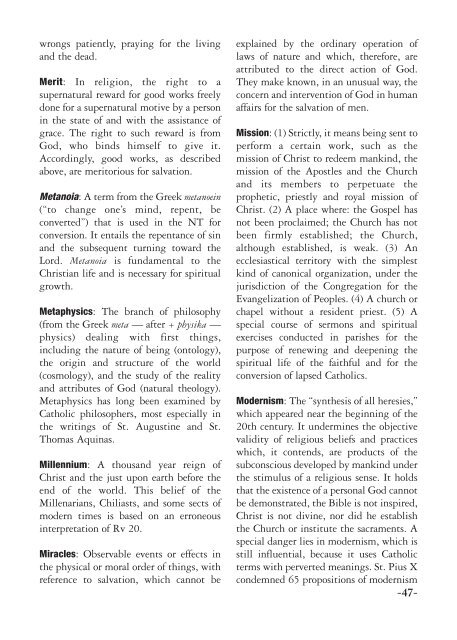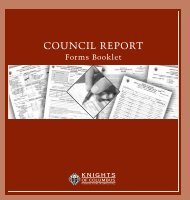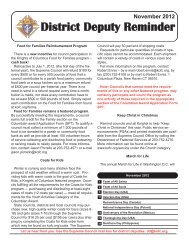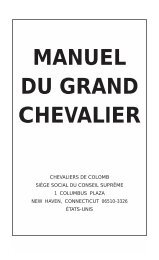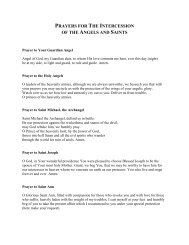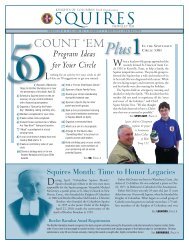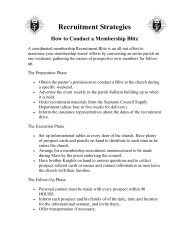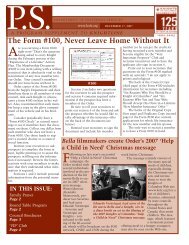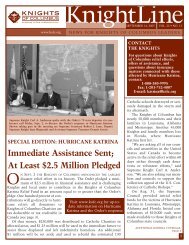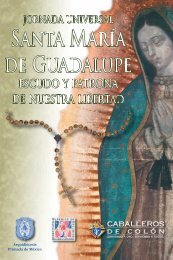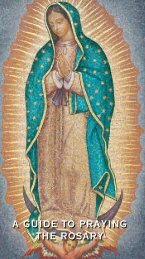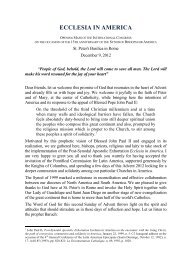CATHOLIC WORD BOOK - Knights of Columbus, Supreme Council
CATHOLIC WORD BOOK - Knights of Columbus, Supreme Council
CATHOLIC WORD BOOK - Knights of Columbus, Supreme Council
You also want an ePaper? Increase the reach of your titles
YUMPU automatically turns print PDFs into web optimized ePapers that Google loves.
wrongs patiently, praying for the living<br />
and the dead.<br />
Merit: In religion, the right to a<br />
supernatural reward for good works freely<br />
done for a supernatural motive by a person<br />
in the state <strong>of</strong> and with the assistance <strong>of</strong><br />
grace. The right to such reward is from<br />
God, who binds himself to give it.<br />
Accordingly, good works, as described<br />
above, are meritorious for salvation.<br />
Metanoia: A term from the Greek metanoein<br />
(“to change one’s mind, repent, be<br />
converted”) that is used in the NT for<br />
conversion. It entails the repentance <strong>of</strong> sin<br />
and the subsequent turning toward the<br />
Lord. Metanoia is fundamental to the<br />
Christian life and is necessary for spiritual<br />
growth.<br />
Metaphysics: The branch <strong>of</strong> philosophy<br />
(from the Greek meta — after + physika —<br />
physics) dealing with first things,<br />
including the nature <strong>of</strong> being (ontology),<br />
the origin and structure <strong>of</strong> the world<br />
(cosmology), and the study <strong>of</strong> the reality<br />
and attributes <strong>of</strong> God (natural theology).<br />
Metaphysics has long been examined by<br />
Catholic philosophers, most especially in<br />
the writings <strong>of</strong> St. Augustine and St.<br />
Thomas Aquinas.<br />
Millennium: A thousand year reign <strong>of</strong><br />
Christ and the just upon earth before the<br />
end <strong>of</strong> the world. This belief <strong>of</strong> the<br />
Millenarians, Chiliasts, and some sects <strong>of</strong><br />
modern times is based on an erroneous<br />
interpretation <strong>of</strong> Rv 20.<br />
Miracles: Observable events or effects in<br />
the physical or moral order <strong>of</strong> things, with<br />
reference to salvation, which cannot be<br />
explained by the ordinary operation <strong>of</strong><br />
laws <strong>of</strong> nature and which, therefore, are<br />
attributed to the direct action <strong>of</strong> God.<br />
They make known, in an unusual way, the<br />
concern and intervention <strong>of</strong> God in human<br />
affairs for the salvation <strong>of</strong> men.<br />
Mission: (1) Strictly, it means being sent to<br />
perform a certain work, such as the<br />
mission <strong>of</strong> Christ to redeem mankind, the<br />
mission <strong>of</strong> the Apostles and the Church<br />
and its members to perpetuate the<br />
prophetic, priestly and royal mission <strong>of</strong><br />
Christ. (2) A place where: the Gospel has<br />
not been proclaimed; the Church has not<br />
been firmly established; the Church,<br />
although established, is weak. (3) An<br />
ecclesiastical territory with the simplest<br />
kind <strong>of</strong> canonical organization, under the<br />
jurisdiction <strong>of</strong> the Congregation for the<br />
Evangelization <strong>of</strong> Peoples. (4) A church or<br />
chapel without a resident priest. (5) A<br />
special course <strong>of</strong> sermons and spiritual<br />
exercises conducted in parishes for the<br />
purpose <strong>of</strong> renewing and deepening the<br />
spiritual life <strong>of</strong> the faithful and for the<br />
conversion <strong>of</strong> lapsed Catholics.<br />
Modernism: The “synthesis <strong>of</strong> all heresies,”<br />
which appeared near the beginning <strong>of</strong> the<br />
20th century. It undermines the objective<br />
validity <strong>of</strong> religious beliefs and practices<br />
which, it contends, are products <strong>of</strong> the<br />
subconscious developed by mankind under<br />
the stimulus <strong>of</strong> a religious sense. It holds<br />
that the existence <strong>of</strong> a personal God cannot<br />
be demonstrated, the Bible is not inspired,<br />
Christ is not divine, nor did he establish<br />
the Church or institute the sacraments. A<br />
special danger lies in modernism, which is<br />
still influential, because it uses Catholic<br />
terms with perverted meanings. St. Pius X<br />
condemned 65 propositions <strong>of</strong> modernism<br />
-47-


